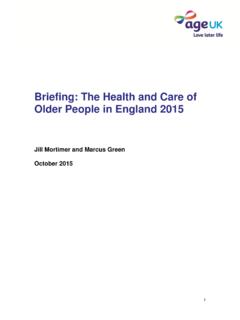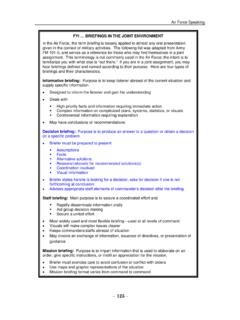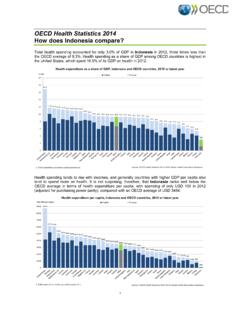Transcription of Promoting Health While Mitigating Climate Change
1 1 | P a g e Promoting Health While Mitigating Climate Change Technical briefing for the world Health organization Conference on Health and Climate 27-29 August, Geneva DISCUSSION DRAFT 2 | P a g e Scope and purpose of the paper This is one of two technical background papers prepared as a basis for discussion at the WHO Health and Climate Conference. It provides a brief summary of the available evidence on the Health impacts (co-benefits and risks) of Climate Change mitigation strategies, and an outline of the necessary Health sector responses that may contribute to optimizing co-benefits While Mitigating risks.
2 The accompanying paper provides a brief summary of the available evidence on the Health impacts of Climate Change and responses needed to protect Health from these evolving risks, including areas of Health system strengthening. Acknowledgements This paper is a work in progress which will be refined following further and more extensive consultation during and after the conference. As it stands, the current draft provides a flavour of what could be achieved for public Health from harnessing the wealth of information and experience on Climate mitigation Health co-benefits.
3 The draft draws upon WHO s reviews of the Health co-benefits of Climate Change mitigation measures discussed in the Fourth and Fifth Assessment Reports of the Intergovernmental on Climate Change (IPCC) Mitigation of Climate Change (IPCC, WGIII/AR5) and (IPCC, WGIII/AR4), as presented in the Health in Green Economy series ( ). The report also draws upon WHO work on Health indicators of sustainable development ; a new report on Access to Modern Energy Services for Health Facilities in Resource-Constrained Settings (WHO, 2014); forthcoming WHO paper on Reducing Short Lived Climate Pollutants for Better Health Early Responses; and a forthcoming WHO EURO technical briefing on the Health implications of the IPCC Fifth Assessment report (IPCC, WGIII/AR5).
4 Direct quotations from the IPCC are indicated with the use of italics, and in-text references are provided to their location in WGIII. An initial draft of this paper was written by Nick Watts (University College London), with later contributions from Carlos Dora, Elaine Fletcher, Michaela Pfeiffer, and Heather Adair-Rohan (WHO-HQ). Earlier versions benefitted from review by WHO Regional Focal Points, Diarmid Campbell-Lendrum, Marina Maiero, Lucia Fernandez Montoya and Kelly Lao (WHO-HQ) and Professor Andy Haines, London School of Hygiene and Tropical Medicine.
5 Oversight of Dr Maria, Director, Department of Public Health , Environmental and Social Determinants of Health , is also gratefully acknowledged. The many contributors to the Health in Green Economy series are gratefully acknowledged, along with the following lead authors: Nathalie Roebbel (Housing), Jamie Hosking (Transport), Tara Garnett (Agriculture), Walter Vernon and Susan Wilburn ( Health Care); and Noah Scovronick (SLCPs & Health ). 3 | P a g e Table of Contents Scope and purpose of the paper .. 2 Acknowledgements .. 2 Executive summary.
6 4 1. Introduction .. 7 2. Health impacts of mitigation potential co-benefits and risks to be mitigated .. 8 Energy and power supply .. 9 Household Energy .. 11 Transport .. 13 Buildings and residential housing .. 15 Industry .. 17 Agriculture and forestry and other land use .. 18 3. Building healthy and sustainable cities .. 20 Air pollution .. 21 Urban transport systems .. 22 Urban design and the Heat Island Effect .. 22 City-level governance .. 23 4. Climate -smart Health systems .. 24 Access to clean energy and renewable energy production.
7 24 Green Health care buildings .. 26 Procurement and consumables management .. 26 Health -care waste management .. 27 Healthy and low-carbon models of care - telemedicine and e- Health .. 27 5. Economic Considerations and existing Governance Mechanisms .. 28 6. Conclusion .. 29 References .. 32 4 | P a g e Executive summary There is a very large, unrecognized potential to obtain Health co-benefits from policies that reduce Climate Change . Moreover, many of these benefits can be enjoyed locally, by communities that adopt low-carbon development strategies.
8 Some of the most important Health benefits include: reduced risks from air pollution-related diseases and fewer environmental Health risks from transport, housing, and energy systems as well as Health benefits from healthier lifestyles ( more physical activity) and diets. Climate Change mitigation policies can therefore prevent significant communicable and non-communicable disease caused by key economic sectors. This can translate into significant Health cost-savings from averted deaths and diseases. Harnessing Climate Change actions for Health benefits can play a transformative role in the Climate debate strengthening public and policymaker will for action.
9 Many Health benefits of Climate Change mitigation can also often be enjoyed in the near- or mid-term While reducing Climate Change s long-term risks ( increased droughts, extreme weather, disease pattern changes, etc.). For example, well planned urban public transport policies that encourage walking and cycling, as preferred modes of transport, not only emit less Climate Change pollutants, they also reduce very immediately traffic injury deaths, promote increased physical activity, and air pollution-related mortality (from strokes, respiratory and heart disease).
10 Air pollution is a special example of the linkage between Climate Change and Health . Outdoor (ambient) air pollution and household pollution (PM2,5) from solid fuel cookstoves causes an estimated 1 in every eight premature deaths, or roughly 7 million a year. Inefficient fuel combustion of fossil fuels and biomass that creates particulate air pollution (PM2,5) also generates Climate pollutants ( CO2,). A significant proportion of particulate pollution may include black carbon, which is a short-lived Climate pollutant.

















